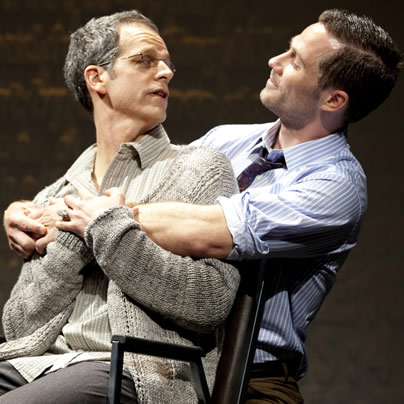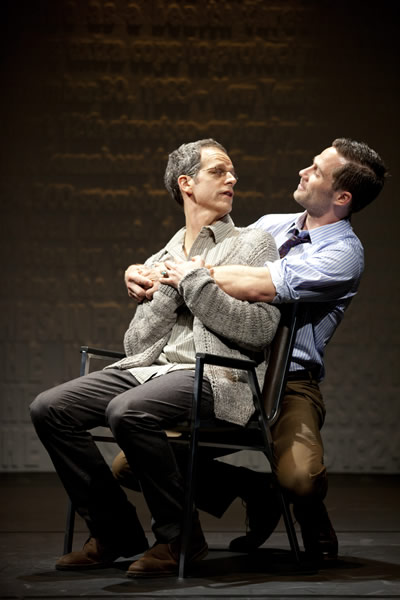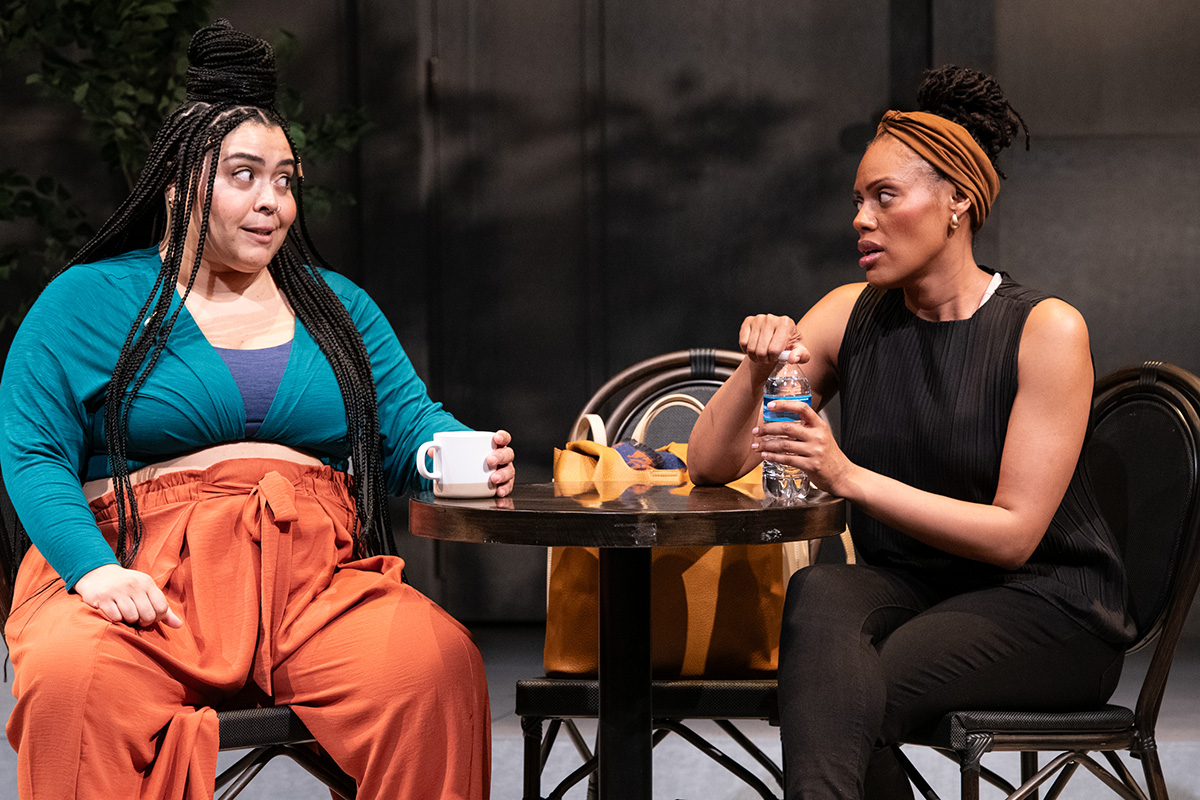Arts & Entertainment
‘Heart’ of the matter
Gay-penned classic gets first-ever D.C.-area production


Patrick Breen, left, as Ned and Luke MacFarlane as Felix in ‘The Normal Heart’ at Arena Stage. (Photo by Scott Suchman; courtesy Arena )
‘The Normal Heart’
Through July 29
Arena Stage
1101 6th Street, SW
$40-$94
202-488-3300
arenastage.org
Larry Kramer’s “The Normal Heart,” is aging well, breathtakingly so. This was proved last year on Broadway and it’s being demonstrated again with a powerfully searing production now playing at Arena Stage.
When Kramer’s biographical take on the early days of the AIDS crisis premiered in New York in 1985, gay men were dying in large numbers and then-President Reagan had yet to utter the word “AIDS” publicly, so not surprisingly the gay playwright’s words reportedly rang angry and alarmed. Today, Arena’s stripped-down and fast-paced revival helmed by gay director George C. Wolfe (who co-staged the Tony-winning Broadway version) still conveys the fury and fear while embracing the empathy and sadness also found in Kramer’s stunning play.
Kramer’s script wastes no time in establishing the horror of the situation. Seated in their doctor’s waiting room (circa 1981 Manhattan), several gay men tensely discuss the still nameless plague that is making them ill and killing their friends. They talk early symptoms (swollen glands, night sweats, fatigue), treatment (almost nothing) and chances of survival (slim). As one patient exits the office revealing a youthful face jarringly marred by Kaposi sarcoma lesions, another enters collapsing from the effects of a violent seizure. The plague is on and it’s going to get worse.
The action focuses on irascible but likeable writer/activist Ned Weeks, a Kramer stand-in superbly played with nuance and great heart by Patrick Been. After several informational meetings and an examination with Dr. Brookner (Patricia Wettig), a prickly physician whose patients include many of the epidemics’ first victims, Ned is convinced that gay men will need to save themselves. He suspects the disease is sexually transmitted.
Determined to rally gays to action, Ned creates an advocacy group similar to Gay Men’s Health Crisis (co-founded by Kramer), and manages to grow the organization despite a lack of support from closeted New York City Mayor Ed Koch and a largely apathetic gay community. Eventually, Ned’s co-members, wrongly but understandably, reject his increasingly angry style as well as his promotion of total abstinence (the concept of safe sex would come later). “We just feel that you can’t tell people how to live,” says Bruce (Nick Mennell), one of the organization’s more popular members. Ned is forced out.
More than a tirade, “The Normal Heart” is also an absorbing family drama. Ned has the love and support of his hotshot lawyer brother played by John Procaccino, but yearns for his total acceptance. It’s also a medical mystery and quite strikingly, a sweet love story. While the plague rages, Ned unexpectedly finds love with Felix, a New York Times style writer beautifully played by handsome gay actor Luke Macfarlane. He’s Ned’s first serious lover.
In the second act when Felix is diagnosed with the deadly virus, he warns Ned that things will become messy, and indeed they do. Messy and heartbreaking, as evidenced by the ongoing sniffles and stifled sobs heard throughout Arena’s Kreeger Theatre.
Plague weary, the central characters finally crack in a series of emotionally raw monologues. Beleaguered activist Mickey (subtly played by Michael Berresse) considers suicide; the typically reserved Dr. Brookner rails against the smug government doctor who refuses her application for a grant; conservative Bruce, a bank V.P. and former Green Beret, dissolves to tears explaining his late lover’s humiliating death; and Ned fiercely expresses his disappointment with the gay community’s inadequate early response to the epidemic.
David Rockwell’s stark set is quietly monumental: White walls embossed with AIDS-related words and phrases (also white) which — depending on the David Weiner’s smart lighting — can or cannot be seen in relief. Also, various locale descriptions and, most affectively, the names of actual AIDS victims are projected on to the set. As the play progresses, these projected names grow exponentially.
The terrific cast also includes Christopher J. Hanke as Tommy Boatwright, a saucy but caring southerner; Jon Levenson as the mayor’s imperious aide de camp; local actor Chris Dinolfo is the young patient with K.S; and Tom Berklund plays Grady, a dim but well-built volunteer.
For Kramer, who learned he was HIV-positive in 1988, “The Normal Heart” might simply serve as proof that he was right all along, but that’s antithetical to his fighting spirit. At Arena, leaflets penned by Kramer decrying the un-won global war on AIDS are distributed to audience members as they leave. The battle continues.
Theater
Round House explores serious issues related to privilege
‘A Jumping-Off Point’ is absorbing, timely, and funny

‘A Jumping-Off Point’
Through May 5
Round House Theatre
4545 East-West Highway, Bethesda, Md.
$46-$83
Roundhousetheatre.org
In Inda Craig-Galván’s new play “A Jumping-Off Point,” protagonist Leslie Wallace, a rising Black dramatist, believes strongly in writing about what you know. Clearly, Craig-Galván, a real-life successful Black playwright and television writer, adheres to the same maxim. Whether further details from the play are drawn from her life, is up for speculation.
Absorbing, timely, and often funny, the current Round House Theatre offering explores some serious issues surrounding privilege and who gets to write about what. Nimbly staged and acted by a pitch perfect cast, the play moves swiftly across what feels like familiar territory without being the least bit predictable.
After a tense wait, Leslie (Nikkole Salter) learns she’s been hired to be showrunner and head writer for a new HBO MAX prestige series. What ought to be a heady time for the ambitious young woman quickly goes sour when a white man bearing accusations shows up at her door.
The uninvited visitor is Andrew (Danny Gavigan), a fellow student from Leslie’s graduate playwriting program. The pair were never friends. In fact, he pressed all of her buttons without even trying. She views him as a lazy, advantaged guy destined to fail up, and finds his choosing to dramatize the African American Mississippi Delta experience especially annoying.
Since grad school, Leslie has had a play successfully produced in New York and now she’s on the cusp of making it big in Los Angeles while Andrew is bagging groceries at Ralph’s. (In fact, we’ll discover that he’s a held a series of wide-ranging temporary jobs, picking up a lot of information from each, a habit that will serve him later on, but I digress.)
Their conversation is awkward as Andrew’s demeanor shifts back and forth from stiltedly polite to borderline threatening. Eventually, he makes his point: Andrew claims that Leslie’s current success is entirely built on her having plagiarized his script.
This increasingly uncomfortable set-to is interrupted by Leslie’s wisecracking best friend and roommate Miriam who has a knack for making things worse before making them better. Deliciously played by Cristina Pitter (whose program bio describes them as “a queer multi-spirit Afro-indigenous artist, abolitionist, and alchemist”), Miriam is the perfect third character in Craig-Galván’s deftly balanced three-hander.
Cast members’ performances are layered. Salter’s Leslie is all charm, practicality, and controlled ambition, and Gavigan’s Andrew is an organic amalgam of vulnerable, goofy, and menacing. He’s terrific.
The 90-minute dramedy isn’t without some improbable narrative turns, but fortunately they lead to some interesting places where provoking questions are representation, entitlement, what constitutes plagiarism, etc. It’s all discussion-worthy topics, here pleasingly tempered with humor.
New York-based director Jade King Carroll skillfully helms the production. Scenes transition smoothly in large part due to a top-notch design team. Scenic designer Meghan Raham’s revolving set seamlessly goes from Leslie’s attractive apartment to smart cafes to an HBO writers’ room with the requisite long table and essential white board. Adding to the graceful storytelling are sound and lighting design by Michael Keck and Amith Chandrashaker, respectively.
The passage of time and circumstances are perceptively reflected in costume designer Moyenda Kulemeka’s sartorial choices: heels rise higher, baseball caps are doffed and jackets donned.
“A Jumping-Off Point” is the centerpiece of the third National Capital New Play Festival, an annual event celebrating new work by some of the country’s leading playwrights and newer voices.
Nightlife
Ed Bailey brings Secret Garden to Project GLOW festival
An LGBTQ-inclusive dance space at RFK this weekend

When does a garden GLOW? When it’s run by famed local gay DJ Ed Bailey.
This weekend, music festival Project GLOW at RFK Festival Grounds will feature Bailey’s brainchild the Secret Garden, a unique space just for the LGBTQ community that he launched in 2023.
While Project GLOW, running April 27-28, is a stage for massive electronic DJ sets in a large outdoor space, Secret Garden is more intimate, though no less adrenaline-forward. He’s bringing the nightclub to the festival. The garden is a dance area that complements the larger stages, but also stands on its own as a draw for festival-goers. Its focus is on DJs that have a presence and following in the LGBTQ audience world.
“The Secret Garden is a showcase for what LGBTQ nightlife, and nightclubs in general, are all about,” he says. “True club DJs playing club music for people that want to dance in a fun environment that is high energy and low stress. It’s the cool party inside the bigger party.”
Project GLOW launched in 2022. Bailey connected with the operators after the first event, and they discussed Bailey curating his own space for 2023. “They were very clear that they wanted me to lean into the vibrant LGBTQ nightlife of D.C. and allow that community to be very visibly a part of this area.”
Last year, club icon Kevin Aviance headlined the Secret Garden. The GLOW festival organizers loved the its energy from last year, and so asked Bailey to bring it back again, with an entire year to plan.
This year, Bailey says, he is “bringing in more D.C. nightlife legends.” Among those are DJ Sedrick, “a DJ and entertainer legend. He was a pivotal part of Tracks nightclub and is such a dynamic force of entertainment,” says Bailey. “I am excited for a whole new audience to be able to experience his very special brand of DJing!”
Also, this year brings in Illustrious Blacks, a worldwide DJ duo with roots in D.C.; and “house music legends” DJs Derrick Carter and DJ Spen.
Bailey is focusing on D.C.’s local talent, with a lineup including Diyanna Monet, Strikestone!, Dvonne, Baronhawk Poitier, THABLACKGOD, Get Face, Franxx, Baby Weight, and Flower Factory DJs KS, Joann Fabrixx, and PWRPUFF.
Secret Garden also brings in performers who meld music with dance, theater, and audience interactions for a multi-sensory experience.
Bailey is an owner of Trade and Number Nine, and was previously an owner of Town Danceboutique. Over the last 35 years, Bailey owned and operated more than 10 bars and clubs in D.C. He has an impressive resume, too. Since starting in 1987, he’s DJ’d across the world for parties and nightclubs large and intimate. He says that he opened “in concert for Kylie Minogue, DJed with Junior Vasquez, played giant 10,000-person events, and small underground parties.” He’s also held residencies at clubs in Atlanta, Miami, and here in D.C. at Tracks, Nation, and Town.
With Secret Garden, Bailey and GLOW aim to bring queer performers into the space not just for LGBTQ audiences, but for the entire music community to meet, learn about, and enjoy. While they might enjoy fandom among queer nightlife, this Garden is a platform for them to meet the entirety of GLOW festival goers.
Weekend-long Project GLOW brings in headliners and artists from EDM and electronic music, with big names like ILLENIUM, Zedd, and Rezz. In all, more than 50 artists will take the three stages at the third edition of Project GLOW, presented by Insomniac (Electric Daisy Carnival) and Club Glow (Echostage, Soundcheck).
Out & About
Washington Improv Theatre hosts ‘The Queeries’
Event to celebrate queer DMV talent and pop culture camp

The Washington Improv Theatre, along with the Mayor’s Office of LGBTQ Affairs and the Gay Men’s Chorus of Washington DC, will team up to host “The Queeries!” on Friday, April 26 at 9:30 p.m. at Studio Theatre.
The event will celebrate Queer DMV talent and pop culture camp. With a mixture of audience-submitted nominations and blatantly undemocratically declared winners, “The Queeries!” mimics LGBTQ life itself: unfair, but far more fun than the alternative.
The event will be co-hosted by Birdie and Butchie, who have invited some of their favorite bent winos, D.C. “D-listers,” former Senate staffers, and other stars to sashay down the lavender carpet for the selfie-strewn party of the year.
Tickets are just $15 and can be purchased on WITV’s website.
-

 State Department3 days ago
State Department3 days agoState Department releases annual human rights report
-

 South America1 day ago
South America1 day agoArgentina government dismisses transgender public sector employees
-

 District of Columbia1 day ago
District of Columbia1 day agoCatching up with the asexuals and aromantics of D.C.
-

 Politics4 days ago
Politics4 days agoSmithsonian staff concerned about future of LGBTQ programming amid GOP scrutiny












